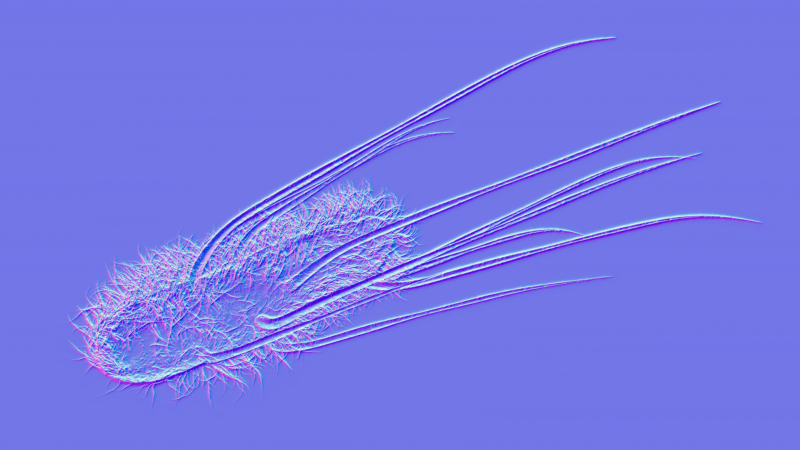Damage from gut bacteria may play a role in the rise in colon cancer in young adults
It’s unclear why colon cancer cases have doubled in people under 55 over the past two decades, a staggering rise that has alarmed doctors and cancer researchers.
But part of the story could be colibactin, a toxin made by certain strains of E. coli and other bacteria. In a study out this week, researchers have identified a strong link between this DNA-damaging toxin and colon cancer among younger patients.
The team, based at the University of California, San Diego, analyzed tissue samples from close to 1,000 colorectal cancer patients across four continents. They found the majority had cancers bearing mutations that signaled a past encounter with colibactin.
“You can think of it as the weapon system of a bacteria to fight other bacteria and to defend themselves,” says Ludmil Alexandrov, the lead author of the study, which was published in Nature this week.
Strikingly, those under the age of 40 with early-onset colon cancer were three to five times more likely to have these mutations than those in their 70s and older.
The thinking goes that in some people, this bacterial weaponry — technically called a “genotoxin” — can get directed at their gut cells, seeding mutations that put them at increased risk of developing colorectal cancer.
According to their data, this exposure isn’t ongoing when the cancer is diagnosed. Instead, it appears to have happened during childhood.
“Our estimate is that it happens within the first 10 years of life,” Alexandrov says. “So if you get that mutation at age 5, that puts you 20 to 30 years ahead of schedule for getting colorectal cancer.”
While the study shows a strong association, the data can’t prove colibactin caused these patients to develop cancer at a younger age. And researchers in the field don’t expect E. coli, or any single microbe for that matter, to be the skeleton key for the surge in colorectal cancer.
“That would be too simple,” says Christian Jobin, a microbiome researcher at the University of Florida.
More likely, he says, colibactin — studied closely in E. coli but produced by other bacteria, too — is one “hit” among many to our microbiome, which together may place some people on a faster trajectory for developing cancer.
What triggers a DNA-damaging toxin
The study is a new clue into the rise in colorectal cancer in the young. Scientists believe some confluence of environmental factors, including diet, a sedentary lifestyle, medication and so on, is driving this steep rise.
These could be having downstream effects on the microbes in our gut like E. coli.
“It’s been really perplexing,” says Dr. Neelendu Dey, a gastroenterologist whose lab focuses on the gut microbiome at the Fred Hutchinson Cancer Center. “The microbes that may contribute to cancer risk are tricky to understand.”
The family of microbes to which E. coli belongs is actually the most prevalent type of bacteria in your gut during the very early stages of life. In other words, it’s not some new infectious agent that needs to be eliminated.
About 20% to 30% of people have strains of E. coli that can synthesize this toxin, but that doesn’t mean it’s necessarily having “deleterious effects,” says Jobin, whose lab has pioneered related research.
Adding to the puzzle: Not everyone with colorectal cancer has these signatures of colibactin-related mutations.
There’s something provoking the bacteria to behave this way, perhaps giving it an advantage to grow in more abundance. “What triggers this weapon or the deployment?” Jobin says. “We don’t know but we have to consider the environment.”
“We know that some of these E. coli that produce colibactin are influenced by diet, inflammation, and medication,” he adds.
Jobin says the new research is “fantastic” because it bridges early preclinical research in animals with “real life humans,” and opens new avenues for research.
Studies conducted on animals have shown colibactin exposure can drive cancer development.
For example, deleting the genetic region responsible for producing this toxin in E. coli can actually incapacitate the bacteria from promoting cancer in animals. Feeding the animals more or less fiber can affect tumor growth.
Antibiotics use and nutrition, could be at play
Because they sequenced the genome of cancer from patients all over the globe, Alexandrov says the researchers could tell these mutations related to colibactin are actually quite rare in more “rural, non-industrialized” regions of Africa and Asia, whereas they turn up more frequently in the U.S. and Western Europe.
That evidence, coupled with the findings that it’s a result of early childhood exposure, gives them a handful of hypotheses about what could be at play.
He says some of their top suspects are the mode of birth (cesarean section vs. vaginal delivery), breastfeeding, the use of antibiotics and nutrition, for example whether children were fed ultra processed foods.
“All of these factors are known to substantially affect the microbiome and there is some evidence they may impact this [colibactin producing] bacteria, but we really need to investigate each one carefully.”
Dey views all of these as plausible, particularly antibiotics, given that other research teams have linked early-life antibiotic use to increased risk of colorectal cancer later on.
More broadly, he says he hopes researchers can eventually find microbes that serve as “biomarkers” for identifying people at risk of developing pre-cancers. And, perhaps down the line, drugs can be designed to target toxins like colibactin to counter their harmful effects.
“Of course, it sounds simple, but we have to acknowledge the ecological lessons learned in other contexts,” he says. “When you try to take out, or introduce a species, it can have effects that you didn’t anticipate, so this all needs to be done very thoughtfully.”
U.S. gave Ukraine and Russia June deadline to reach peace agreement, Zelenskyy says
"The Americans are proposing the parties end the war by the beginning of this summer," Zelenskyy said, speaking to reporters on Friday.
U.K. leader’s chief of staff quits over hiring of Epstein friend as U.S. ambassador
British Prime Minister Keir Starmer's chief of staff resigned Sunday over the furor surrounding the appointment of Peter Mandelson as U.K. ambassador to the U.S. despite his ties to Jeffrey Epstein.
Trump administration lauds plastic surgeons’ statement on trans surgery for minors
A patient who came to regret the top surgery she got as a teen won a $2 million malpractice suit. Then, the American Society of Plastic Surgeons clarified its position that surgery is not recommended for transgender minors.
What you should know about Bad Bunny’s Super Bowl halftime show
Will the Puerto Rican superstar bring out any special guests? Will there be controversy? Here's what you should know about what could be the most significant concert of the year.
Sunday Puzzle: -IUM Pandemonium
NPR's Ayesha Rascoe plays the puzzle with KPBS listener Anthony Baio and Weekend Edition Puzzlemaster Will Shortz.
Thailand counts votes in early election with 3 main parties vying for power
Vote counting was underway in Thailand's early general election on Sunday, seen as a three-way race among competing visions of progressive, populist and old-fashioned patronage politics.








